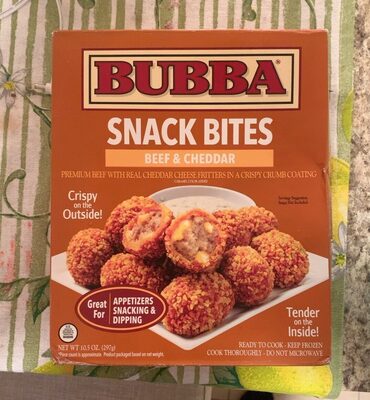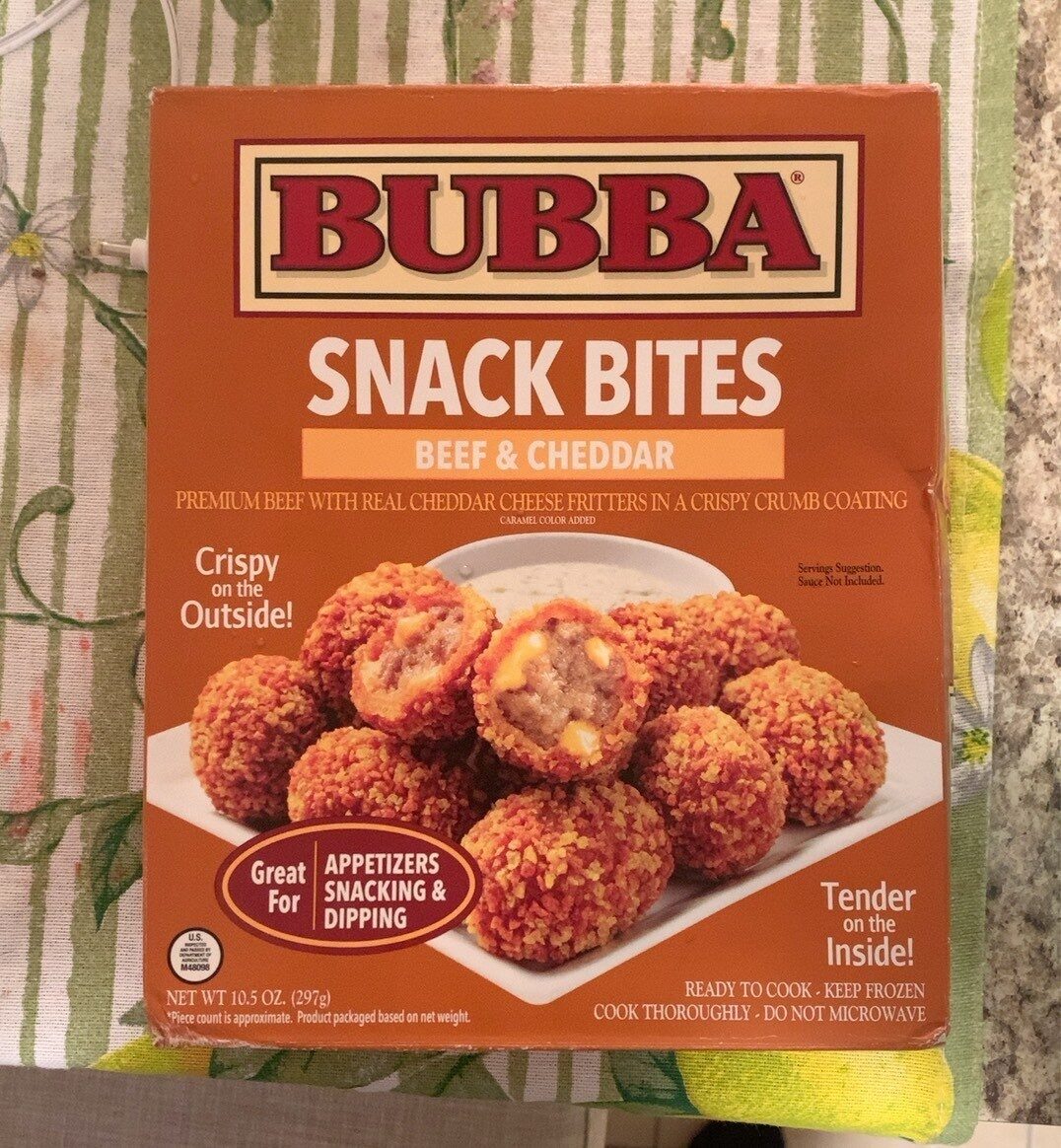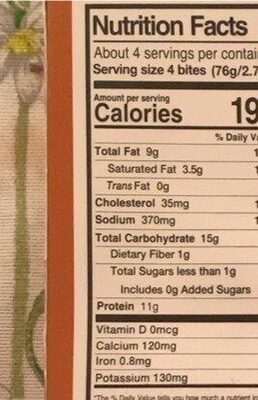Help us make food transparency the norm!
As a non-profit organization, we depend on your donations to continue informing consumers around the world about what they eat.
The food revolution starts with you!
Snack bites beef and cheddar
Snack bites beef and cheddar
This product page is not complete. You can help to complete it by editing it and adding more data from the photos we have, or by taking more photos using the app for Android or iPhone/iPad. Thank you!
×
Barcode: 0704639248320 (EAN / EAN-13) 704639248320 (UPC / UPC-A)
Brand owner: Hickory Foods, Inc.
Categories: Frozen foods
Countries where sold: United States
Matching with your preferences
Health
Ingredients
-
40 ingredients
Filling (beef, pasteurized process sharp cheddar cheese [cheddar cheese (milk, cheese culture, salt, enzymes), water, cream, lemon juice concentrate, salt, cellulose, pectin, paprika, beta carotene] water, potato starch, oat fiber, black pepper), breading (water, wheat flour, vegetable protein, wheat starch, corn starch, soy flour, whole grain yellow cornmeal, potato starch, egg white, salt, disodium diphosphate, sodium bicarbonate, caramel color, mono - and diglycerides, guar gum, ascorbic acid, annatto extract, turmeric, lauryl sulfate).Allergens: Beef, Eggs, Gluten, Milk, Soybeans
Food processing
-
Ultra processed foods
Elements that indicate the product is in the 4 - Ultra processed food and drink products group:
- Additive: E150c - Ammonia caramel
- Additive: E412 - Guar gum
- Additive: E440 - Pectins
- Additive: E450 - Diphosphates
- Additive: E460 - Cellulose
- Additive: E471 - Mono- and diglycerides of fatty acids
Food products are classified into 4 groups according to their degree of processing:
- Unprocessed or minimally processed foods
- Processed culinary ingredients
- Processed foods
- Ultra processed foods
The determination of the group is based on the category of the product and on the ingredients it contains.
Additives
-
E412 - Guar gum
Guar gum (E412) is a natural food additive derived from guar beans.
This white, odorless powder is valued for its remarkable thickening and stabilizing properties, making it a common ingredient in various food products, including sauces, dressings, and ice creams.
When used in moderation, guar gum is considered safe for consumption, with no known adverse health effects.
-
E440 - Pectins
Pectins (E440) are natural carbohydrates, predominantly found in fruits, that act as gelling agents in the food industry, creating the desirable jelly-like texture in jams, jellies, and marmalades.
Pectins stabilize and thicken various food products, such as desserts, confectioneries, and beverages, ensuring a uniform consistency and quality.
Recognized as safe by various health authorities, pectins have been widely used without notable adverse effects when consumed in typical dietary amounts.
-
E450 - Diphosphates
Diphosphates (E450) are food additives often utilized to modify the texture of products, acting as leavening agents in baking and preventing the coagulation of canned food.
These salts can stabilize whipped cream and are also found in powdered products to maintain their flow properties. They are commonly present in baked goods, processed meats, and soft drinks.
Derived from phosphoric acid, they're part of our daily phosphate intake, which often surpasses recommended levels due to the prevalence of phosphates in processed foods and drinks.
Excessive phosphate consumption is linked to health issues, such as impaired kidney function and weakened bone health. Though diphosphates are generally regarded as safe when consumed within established acceptable daily intakes, it's imperative to monitor overall phosphate consumption to maintain optimal health.
-
E460 - Cellulose
Cellulose: Cellulose is an organic compound with the formula -C6H10O5-n, a polysaccharide consisting of a linear chain of several hundred to many thousands of β-1→4- linked D-glucose units. Cellulose is an important structural component of the primary cell wall of green plants, many forms of algae and the oomycetes. Some species of bacteria secrete it to form biofilms. Cellulose is the most abundant organic polymer on Earth. The cellulose content of cotton fiber is 90%, that of wood is 40–50%, and that of dried hemp is approximately 57%.Cellulose is mainly used to produce paperboard and paper. Smaller quantities are converted into a wide variety of derivative products such as cellophane and rayon. Conversion of cellulose from energy crops into biofuels such as cellulosic ethanol is under development as a renewable fuel source. Cellulose for industrial use is mainly obtained from wood pulp and cotton.Some animals, particularly ruminants and termites, can digest cellulose with the help of symbiotic micro-organisms that live in their guts, such as Trichonympha. In human nutrition, cellulose is a non-digestible constituent of insoluble dietary fiber, acting as a hydrophilic bulking agent for feces and potentially aiding in defecation.Source: Wikipedia
-
E471 - Mono- and diglycerides of fatty acids
Mono- and diglycerides of fatty acids (E471), are food additives commonly used as emulsifiers in various processed foods.
These compounds consist of glycerol molecules linked to one or two fatty acid chains, which help stabilize and blend water and oil-based ingredients. E471 enhances the texture and shelf life of products like margarine, baked goods, and ice cream, ensuring a smooth and consistent texture.
It is generally considered safe for consumption within established regulatory limits.
-
E500 - Sodium carbonates
Sodium carbonates (E500) are compounds commonly used in food preparation as leavening agents, helping baked goods rise by releasing carbon dioxide when they interact with acids.
Often found in baking soda, they regulate the pH of food, preventing it from becoming too acidic or too alkaline. In the culinary world, sodium carbonates can also enhance the texture and structure of foods, such as noodles, by modifying the gluten network.
Generally recognized as safe, sodium carbonates are non-toxic when consumed in typical amounts found in food.
-
E500ii - Sodium hydrogen carbonate
Sodium hydrogen carbonate, also known as E500ii, is a food additive commonly used as a leavening agent.
When added to recipes, it releases carbon dioxide gas upon exposure to heat or acids, causing dough to rise and resulting in a light, fluffy texture in baked goods.
It is generally recognized as safe (GRAS) by regulatory authorities when used in appropriate quantities and poses no significant health risks when consumed in typical food applications.
Ingredients analysis
-
May contain palm oil
Ingredients that may contain palm oil: E160ai, E471
-
Non-vegan
Non-vegan ingredients: Beef, Cheddar, Milk, Cream, Egg whiteSome ingredients could not be recognized.
We need your help!
You can help us recognize more ingredients and better analyze the list of ingredients for this product and others:
- Edit this product page to correct spelling mistakes in the ingredients list, and/or to remove ingredients in other languages and sentences that are not related to the ingredients.
- Add new entries, synonyms or translations to our multilingual lists of ingredients, ingredient processing methods, and labels.
If you would like to help, join the #ingredients channel on our Slack discussion space and/or learn about ingredients analysis on our wiki. Thank you!
-
Non-vegetarian
Non-vegetarian ingredients: BeefSome ingredients could not be recognized.
We need your help!
You can help us recognize more ingredients and better analyze the list of ingredients for this product and others:
- Edit this product page to correct spelling mistakes in the ingredients list, and/or to remove ingredients in other languages and sentences that are not related to the ingredients.
- Add new entries, synonyms or translations to our multilingual lists of ingredients, ingredient processing methods, and labels.
If you would like to help, join the #ingredients channel on our Slack discussion space and/or learn about ingredients analysis on our wiki. Thank you!
-
Details of the analysis of the ingredients
We need your help!
Some ingredients could not be recognized.
We need your help!
You can help us recognize more ingredients and better analyze the list of ingredients for this product and others:
- Edit this product page to correct spelling mistakes in the ingredients list, and/or to remove ingredients in other languages and sentences that are not related to the ingredients.
- Add new entries, synonyms or translations to our multilingual lists of ingredients, ingredient processing methods, and labels.
If you would like to help, join the #ingredients channel on our Slack discussion space and/or learn about ingredients analysis on our wiki. Thank you!
: Filling (beef, pasteurized process sharp cheddar cheese (cheddar cheese (milk, cheese culture, salt, enzymes), water, cream, lemon juice concentrate, salt, cellulose, pectin, paprika, beta carotene), water, potato starch, oat fiber, black pepper), breading (water, wheat flour, vegetable protein, wheat starch, corn starch, soy flour, whole grain yellow cornmeal, potato starch, egg white, salt, disodium diphosphate, sodium bicarbonate, caramel color, mono- and diglycerides, guar gum, ascorbic acid, annatto, turmeric, lauryl sulfate)- Filling -> en:filling - vegan: maybe - vegetarian: maybe - percent_min: 50 - percent_max: 100
- beef -> en:beef - vegan: no - vegetarian: no - percent_min: 8.33333333333333 - percent_max: 100
- pasteurized process sharp cheddar cheese -> en:pasteurized-process-sharp-cheddar-cheese - percent_min: 0 - percent_max: 50
- cheddar cheese -> en:cheddar - vegan: no - vegetarian: maybe - ciqual_food_code: 12726 - percent_min: 0 - percent_max: 50
- milk -> en:milk - vegan: no - vegetarian: yes - ciqual_proxy_food_code: 19051 - percent_min: 0 - percent_max: 50
- cheese culture -> en:lactic-ferments - vegan: maybe - vegetarian: yes - percent_min: 0 - percent_max: 25
- salt -> en:salt - vegan: yes - vegetarian: yes - ciqual_food_code: 11058 - percent_min: 0 - percent_max: 1.2171052631579
- enzymes -> en:enzyme - vegan: maybe - vegetarian: maybe - percent_min: 0 - percent_max: 1.2171052631579
- water -> en:water - vegan: yes - vegetarian: yes - ciqual_food_code: 18066 - percent_min: 0 - percent_max: 25
- cream -> en:cream - vegan: no - vegetarian: yes - ciqual_food_code: 19402 - percent_min: 0 - percent_max: 16.6666666666667
- lemon juice concentrate -> en:concentrated-lemon-juice - vegan: yes - vegetarian: yes - ciqual_food_code: 2028 - percent_min: 0 - percent_max: 12.5
- salt -> en:salt - vegan: yes - vegetarian: yes - ciqual_food_code: 11058 - percent_min: 0 - percent_max: 1.2171052631579
- cellulose -> en:e460 - vegan: yes - vegetarian: yes - percent_min: 0 - percent_max: 1.2171052631579
- pectin -> en:e440a - vegan: yes - vegetarian: yes - percent_min: 0 - percent_max: 1.2171052631579
- paprika -> en:paprika - vegan: yes - vegetarian: yes - ciqual_food_code: 11049 - percent_min: 0 - percent_max: 1.2171052631579
- beta carotene -> en:e160ai - vegan: maybe - vegetarian: maybe - from_palm_oil: maybe - percent_min: 0 - percent_max: 1.2171052631579
- cheddar cheese -> en:cheddar - vegan: no - vegetarian: maybe - ciqual_food_code: 12726 - percent_min: 0 - percent_max: 50
- water -> en:water - vegan: yes - vegetarian: yes - ciqual_food_code: 18066 - percent_min: 0 - percent_max: 33.3333333333333
- potato starch -> en:potato-starch - vegan: yes - vegetarian: yes - ciqual_proxy_food_code: 9510 - percent_min: 0 - percent_max: 25
- oat fiber -> en:oat-fiber - vegan: yes - vegetarian: yes - percent_min: 0 - percent_max: 20
- black pepper -> en:black-pepper - vegan: yes - vegetarian: yes - ciqual_food_code: 11015 - percent_min: 0 - percent_max: 16.6666666666667
- breading -> en:breadcrumbs - vegan: maybe - vegetarian: maybe - ciqual_food_code: 7500 - percent_min: 0 - percent_max: 50
- water -> en:water - vegan: yes - vegetarian: yes - ciqual_food_code: 18066 - percent_min: 0 - percent_max: 50
- wheat flour -> en:wheat-flour - vegan: yes - vegetarian: yes - ciqual_proxy_food_code: 9410 - percent_min: 0 - percent_max: 25
- vegetable protein -> en:plant-protein - vegan: yes - vegetarian: yes - percent_min: 0 - percent_max: 16.6666666666667
- wheat starch -> en:wheat-starch - vegan: yes - vegetarian: yes - ciqual_proxy_food_code: 9510 - percent_min: 0 - percent_max: 12.5
- corn starch -> en:corn-starch - vegan: yes - vegetarian: yes - ciqual_food_code: 9510 - percent_min: 0 - percent_max: 10
- soy flour -> en:soya-flour - vegan: yes - vegetarian: yes - ciqual_food_code: 20900 - percent_min: 0 - percent_max: 8.33333333333333
- whole grain yellow cornmeal -> en:whole-grain-yellow-cornmeal - percent_min: 0 - percent_max: 7.14285714285714
- potato starch -> en:potato-starch - vegan: yes - vegetarian: yes - ciqual_proxy_food_code: 9510 - percent_min: 0 - percent_max: 6.25
- egg white -> en:egg-white - vegan: no - vegetarian: yes - ciqual_food_code: 22001 - percent_min: 0 - percent_max: 5.55555555555556
- salt -> en:salt - vegan: yes - vegetarian: yes - ciqual_food_code: 11058 - percent_min: 0 - percent_max: 1.2171052631579
- disodium diphosphate -> en:e450i - vegan: yes - vegetarian: yes - percent_min: 0 - percent_max: 1.2171052631579
- sodium bicarbonate -> en:e500ii - vegan: yes - vegetarian: yes - percent_min: 0 - percent_max: 1.2171052631579
- caramel color -> en:e150a - vegan: yes - vegetarian: yes - percent_min: 0 - percent_max: 1.2171052631579
- mono- and diglycerides -> en:e471 - vegan: maybe - vegetarian: maybe - from_palm_oil: maybe - percent_min: 0 - percent_max: 1.2171052631579
- guar gum -> en:e412 - vegan: yes - vegetarian: yes - percent_min: 0 - percent_max: 1.2171052631579
- ascorbic acid -> en:e300 - vegan: yes - vegetarian: yes - percent_min: 0 - percent_max: 1.2171052631579
- annatto -> en:e160b - vegan: yes - vegetarian: yes - percent_min: 0 - percent_max: 1.2171052631579
- turmeric -> en:turmeric - vegan: yes - vegetarian: yes - ciqual_proxy_food_code: 11089 - percent_min: 0 - percent_max: 1.2171052631579
- lauryl sulfate -> en:lauryl-sulfate - percent_min: 0 - percent_max: 1.2171052631579
Nutrition
-
Poor nutritional quality
⚠ ️Warning: the amount of fruits, vegetables and nuts is not specified on the label, it was estimated from the list of ingredients: 1This product is not considered a beverage for the calculation of the Nutri-Score.
Positive points: 1
- Proteins: 5 / 5 (value: 14.473684210526, rounded value: 14.47)
- Fiber: 1 / 5 (value: 1.3157894736842, rounded value: 1.32)
- Fruits, vegetables, nuts, and colza/walnut/olive oils: 0 / 5 (value: 1.04166666666667, rounded value: 1)
Negative points: 12
- Energy: 3 / 10 (value: 1018, rounded value: 1018)
- Sugars: 0 / 10 (value: 1.3157894736842, rounded value: 1.32)
- Saturated fat: 4 / 10 (value: 4.6052631578947, rounded value: 4.6)
- Sodium: 5 / 10 (value: 486.84210526316, rounded value: 486.8)
The points for proteins are not counted because the negative points are greater or equal to 11.
Nutritional score: (12 - 1)
Nutri-Score:
-
Nutrient levels
-
Fat in moderate quantity (11.8%)
What you need to know- A high consumption of fat, especially saturated fats, can raise cholesterol, which increases the risk of heart diseases.
Recommendation: Limit the consumption of fat and saturated fat- Choose products with lower fat and saturated fat content.
-
Saturated fat in moderate quantity (4.61%)
What you need to know- A high consumption of fat, especially saturated fats, can raise cholesterol, which increases the risk of heart diseases.
Recommendation: Limit the consumption of fat and saturated fat- Choose products with lower fat and saturated fat content.
-
Sugars in low quantity (1.32%)
What you need to know- A high consumption of sugar can cause weight gain and tooth decay. It also augments the risk of type 2 diabetes and cardio-vascular diseases.
Recommendation: Limit the consumption of sugar and sugary drinks- Sugary drinks (such as sodas, fruit beverages, and fruit juices and nectars) should be limited as much as possible (no more than 1 glass a day).
- Choose products with lower sugar content and reduce the consumption of products with added sugars.
-
Salt in moderate quantity (1.22%)
What you need to know- A high consumption of salt (or sodium) can cause raised blood pressure, which can increase the risk of heart disease and stroke.
- Many people who have high blood pressure do not know it, as there are often no symptoms.
- Most people consume too much salt (on average 9 to 12 grams per day), around twice the recommended maximum level of intake.
Recommendation: Limit the consumption of salt and salted food- Reduce the quantity of salt used when cooking, and don't salt again at the table.
- Limit the consumption of salty snacks and choose products with lower salt content.
-
-
Nutrition facts
Nutrition facts As sold
for 100 g / 100 mlAs sold
per serving (2.7 ONZ (76 g))Compared to: Frozen foods Energy 1,018 kj
(243 kcal)774 kj
(185 kcal)+36% Fat 11.842 g 9 g +57% Saturated fat 4.605 g 3.5 g +28% Trans fat 0 g 0 g -100% Cholesterol 53 mg 40.3 mg +99% Carbohydrates 19.737 g 15 g -1% Sugars 1.316 g 1 g -88% Fiber 1.316 g 1 g -4% Proteins 14.474 g 11 g +162% Salt 1.217 g 0.925 g +166% Potassium 184 mg 140 mg +2% Calcium 158 mg 120 mg +157% Iron 1.18 mg 0.897 mg +64% Fruits‚ vegetables‚ nuts and rapeseed‚ walnut and olive oils (estimate from ingredients list analysis) 1.042 % 1.042 %
Environment
-
Eco-Score not computed - Unknown environmental impact
We could not compute the Eco-Score of this product as it is missing some data, could you help complete it?Could you add a precise product category so that we can compute the Eco-Score? Add a category
Packaging
-
Missing packaging information for this product
⚠ ️ The information about the packaging of this product is not filled in.Take a photo of the recycling information Take a photo of the recycling information
Transportation
-
Origins of ingredients
Missing origins of ingredients information
⚠ ️ The origins of the ingredients of this product are not indicated.
If they are indicated on the packaging, you can modify the product sheet and add them.
If you are the manufacturer of this product, you can send us the information with our free platform for producers.Add the origins of ingredients for this product Add the origins of ingredients for this product
Report a problem
-
Incomplete or incorrect information?
Category, labels, ingredients, allergens, nutritional information, photos etc.
If the information does not match the information on the packaging, please complete or correct it. Open Food Facts is a collaborative database, and every contribution is useful for all.
Data sources
Product added on by org-database-usda
Last edit of product page on by kiliweb.
Product page also edited by yuka.sY2b0xO6T85zoF3NwEKvllJdT4b1vCrpPRflw0Came-xJLy2TddT3rblOKs.








